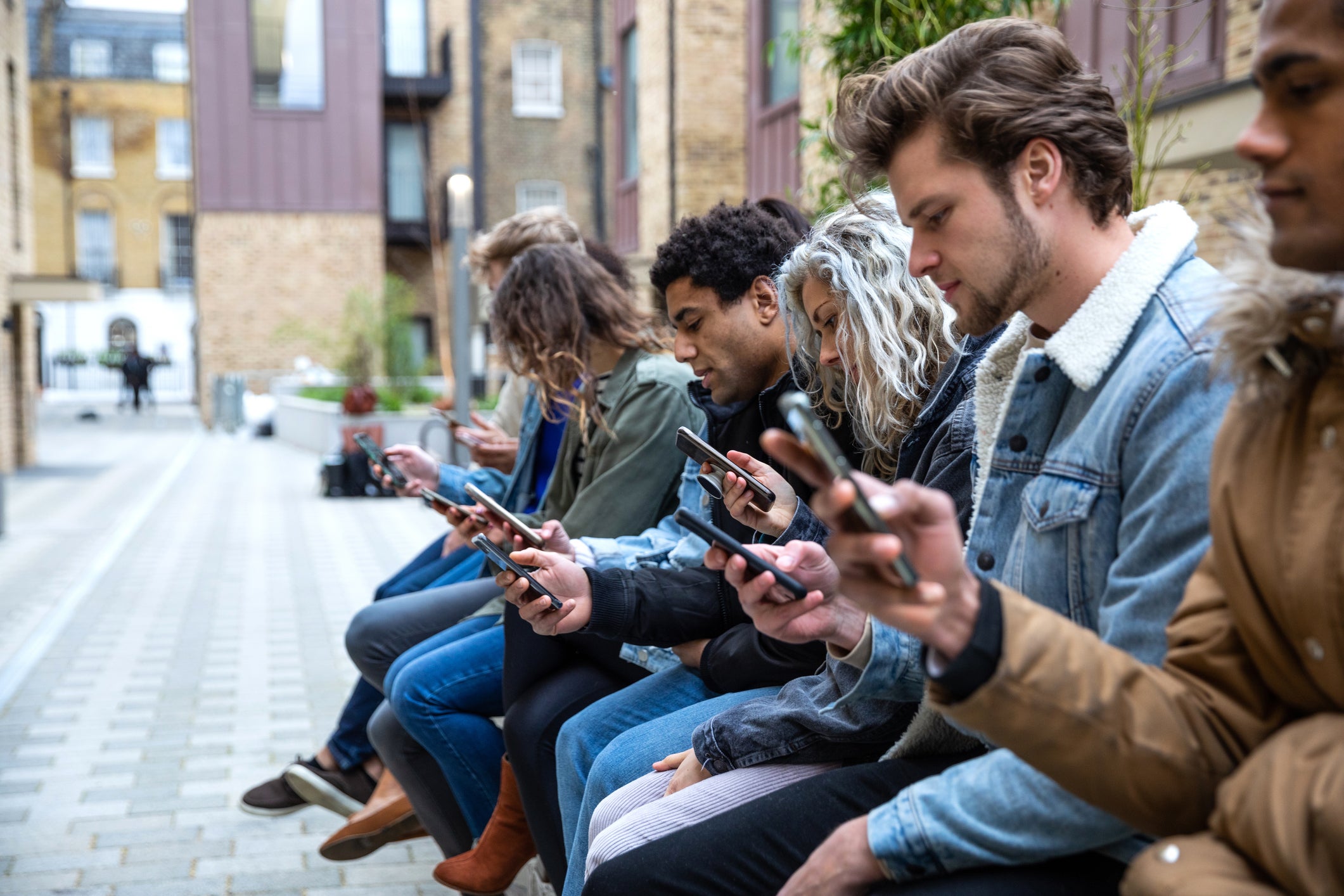It’s an undeniable fact: the human race has never been so connected. Want to get in touch with someone? The main hurdle is picking from the veritable smorgasbord of communication tools at your disposal: Will you use Instagram, X or TikTok DM; text; Facebook Instant Messenger; WhatsApp; FaceTime; email; Snapchat; Zoom; Microsoft Teams; Google Meet; Slack? Or, if you want to go really old school, you could (gasp) call them on the phone. Decisions, decisions!
And yet, despite this ability to contact anyone we’ve ever met in less time than it takes to make a Pot Noodle, friendships seem to be on the wane.
There is growing evidence that platonic relationships are struggling. An American Perspectives Survey, undertaken by US non-profit the Survey Center on American Life in 2021, found that Americans reported having fewer close friendships than they once had, talked to friends less often, and relied less on friends for personal support. Social circles were contracting, according to the research; the proportion of men who claimed to have at least six close friends had gone from 55 per cent in 1990 to half that number (27 per cent) in 2021. While women had seen a less sharp decrease, the number with six good friends or more had nevertheless dropped from 41 to 24 per cent. Nearly half of Americans (49 per cent) had three friends or fewer; 12 per cent reported having “no close friends” at all.
In the post-pandemic world, this trend appears to have continued. A new report from modular agency Modern Citizens revealed that more than one in five (22 per cent) Brits say their social circle has shrunk in the past three years, while nearly half of respondents (47 per cent) said they socialise with family and friends just once a month or less.
The numbers are even more stark for young people. Adults aged 16 to 29 years are more likely than those in older age groups to report feeling lonely “often or always”, according to research from the Campaign to End Loneliness. It goes hand in hand with a stat shared by The Great Friendship Project, a non-profit organisation set up in 2021 to tackle loneliness among young adults: the number of under-35s claiming to have just one or no close friends has more than tripled in the past decade, from 7 to 22 per cent.
So, what’s behind this great “friendship recession”? The Survey Center on American Life identified Covid-19 as “the most obvious culprit in the national friendship decline”. Anna Goldfarb, journalist and author of Modern Friendship and a regular Substack on friendship, agrees that the pandemic “definitely, for some people, reduced their social stamina. They got out of the habit of scheduling their lives around friendships and social outings.”
However, the report also highlighted that “broader structural forces” were potentially having more of an impact. These included a more “geographically mobile” population – ie, people move around more – parents that spent twice as much time with their children compared to previous generations, and a work culture that saw employees working longer hours and travelling more for their jobs.

Irene S Levine, psychologist, creator of The Friendship Blog and author of Best Friends Forever: Surviving a Breakup with Your Best Friend, agrees that friendships have been impacted by our propensity to change postcodes. “It was more common for people to stay in place in the past,” she says. “Young people are now more likely to move multiple times to marry, pursue their education, establish a career, marry, divorce, or experience a different place or culture. Many of these transitions change or upset friendships.”
It also means we meet far more people. Though this may sound like a recipe for more friendships, it can conversely have the opposite effect, according to Goldfarb. “You’d think having more connectivity would make it easier, but it’s actually overwhelmed us. It’s very overwhelming having this constellation of connections you’ve made – growing up, going to different schools, having different jobs – because we’re meeting so many more people than generations past.”
Our growing independence enabled by tech has also had an impact. In times gone by, you’d have practical reasons to reach out and rely on your friends and neighbours – you’d need help moving house, or to borrow a metaphorical (or literal) cup of sugar. “But we’ve outsourced a lot of those tasks now,” adds Goldfarb. “You can just hire an Uber. You can have Amazon send you sugar. You don’t need to rely on your community for the things you need to get by.” Yes, it’s technically easier to connect with all the different people in our lives – “but we don’t necessarily have a reason to do it”.
This is compounded by hectic modern lives that are defined by their busyness. Adults are “likely to be multitasking,” posits Levine. “Juggling work and caregiving for children and/or elderly parents leaves less time for socialising. Leaving time for friendship is often seen as indulgent and self-serving, although it makes them better parents and workers.” And, with the free time we do have, the competing options for how to spend it can squeeze out external relationships. “You can binge watch a show. You can stream anything you want,” says Goldfarb, “options which require so little of you.” By contrast, friendships require “a lot of effort and intention, and that can be a shock when you’re not used to having to put this much effort into keeping friendships going. The reason our circles are shrinking is there’s so much other stuff competing for our attention that’s easier – but it’s not as rewarding as having deep friendships.”
In fact, the entire set-up of modern living is less conducive to forming and maintaining meaningful relationships, argues psychologist Smriti Joshi from digital mental health platform Wysa. “We’re living by the clock, juggling full schedules, long commutes, and digital distractions,” she says. “Many of us are in smaller homes, have fewer shared spaces, and less spontaneous connection. Add in the shift toward nuclear families and solo living, and many of us are simply running low on social energy.”
She emphasises that the digital side of life and social media is exacerbating the problem; we’re more “in touch” than ever, but often in ways that remain shallow and unfulfilling. “It can feel like you’re keeping up with lots of people, but if you take a step back, you realise you haven’t had a proper conversation in weeks,” she adds. “You can scroll all day and still feel like no one truly understands you.”
And it matters that our friendships are ebbing because loneliness is devastatingly detrimental, both physically and mentally. We are social animals; having friendships literally helps us live longer. In the Harvard Study of Adult Development, one of the longest-running studies on adult life, researchers discovered that close relationships were the key to human happiness, which, in turn, helped to delay mental and physical decline. Good relationships were better predictors of having a long and happy life than social class, IQ or even genetics.
“When we gathered together everything we knew about [the study subjects] at age 50, it wasn’t their middle-age cholesterol levels that predicted how they were going to grow old,” said study director Robert Waldinger, a psychiatrist at Massachusetts General Hospital and a professor of psychiatry at Harvard Medical School. “It was how satisfied they were in their relationships. The people who were the most satisfied in their relationships at age 50 were the healthiest at age 80.”

“Loneliness kills,” he added. “It’s as powerful as smoking or alcoholism.” Indeed, studies have shown that chronic loneliness can have similar mortality risks to smoking 15 cigarettes a day, as well as doubling your risk of developing Alzheimer’s. It can also increase the risk of early mortality by 26 per cent. No wonder the World Health Organisation declared loneliness a “pressing global health threat” in 2023.
So, let’s talk numbers. Quality may well beat quantity in the realm of friendship. Evolutionary psychologist Robin Dunbar published a study in the Nineties theorising that humans can cognitively handle a maximum of 150 social relationships (including family and friends) at any given moment. Of these, five was thought to be the optimal number of really close friends.
Another study has suggested that the magic number for ride-or-die buddies is three to five. “That seems to be the sweet spot, and that’s not just people you call friends, but people who would identify you as their best friend,” says Goldfarb. “That’s where maximum happiness comes from.” There are, by necessity, different tiers of friendship with different levels of intimacy. She recommends being “an outstanding friend to three to five people – and everyone else I’ll engage with as my bandwidth allows”. There is no obligation to be, for example, best pals with the woman you occasionally cat-sit for.
Joshi agrees that “one or two really close, consistent friends can mean more for your wellbeing than a huge circle of acquaintances. But what’s worrying is that a lot of people are losing both – the breadth and the depth. Surface-level friendships aren’t always enough when life gets hard or when we just need to be seen.”
All that being said, the American Perspectives Survey found that satisfaction rose in line with the number of friends a person had. Of the respondents who reported having no close friends, only 29 per cent were completely or very satisfied with the number of friends they had. This jumped to 39 per cent for those with one close friend; 43 per cent for those with two or three; 56 per cent for those with four or five; 67 per cent for those with six to nine; and a whopping 75 per cent for those with 10 or more. Sometimes, clearly, more is more.
Reframing how we view the nature of friendship and its purpose can help us foster better relationships, according to the experts. Our social circles require replenishing throughout our lives, advises Levine, while care, attention and intentionality are vital for maintaining friendships: “Keeping friendships alive entails nurturing them by spending time together, sharing the ups and downs, and staying involved in each other’s lives. Because no person or friendship is perfect, they all require compromise and direct communication when problems arise.”
She also warns against expecting all our friendships to “last forever” or stay the same; they naturally change and evolve over time, depending on what life stage we’re at, our geographical proximity, our interests and habits. “People must also avoid falling prey to the myth that our friends must be ‘just like us’,” she adds. “Intergenerational friendships and friendships with people of different backgrounds can enrich our lives and broaden our world.”

Goldfarb, meanwhile, stresses the importance of emotionally investing in others, rather than expecting it to be all about us. “We think, ‘I want people who love me and who cherish me’ – but the key to friendship is finding people that you cherish, and you would do anything for and drop everything to help. You get to bear witness to their challenges and triumphs, and that creates meaning. The antidote to loneliness is to feel like you matter. And the way to matter is to care very deeply about the coolest people you can find and to help them with things that they care about.”
It doesn’t have to take much to rekindle a friendship that’s gone off the boil. Reach out. Send a message to say you’re thinking of them or suggesting a walk or a coffee. Put ego aside and don’t wait for them to make the first move. “So many people are feeling the same way you are, wanting more connection but unsure how to start,” says Joshi. “It’s never too late to try.”



